Analysis of Leadership and Management in Sainsbury's Operations
VerifiedAdded on 2022/12/30
|18
|5134
|77
Report
AI Summary
This report examines leadership and management principles within the context of Sainsbury's, a UK-based retail company. It begins by differentiating between the roles and characteristics of leaders and managers, analyzing their application in various situational contexts. The report then delves into different leadership theories and models, including scientific management and contingency theory, and assesses their relevance to Sainsbury's operations. Furthermore, it analyzes the approaches to operations management, emphasizing the importance and value of operations management in achieving business objectives. Finally, the report evaluates the factors within the business environment that affect decision-making by leaders and managers, providing a comprehensive overview of leadership and management practices in a real-world business setting. The report includes comparisons of different leadership theories and provides insights into how leaders and managers influence employee performance and organizational success.
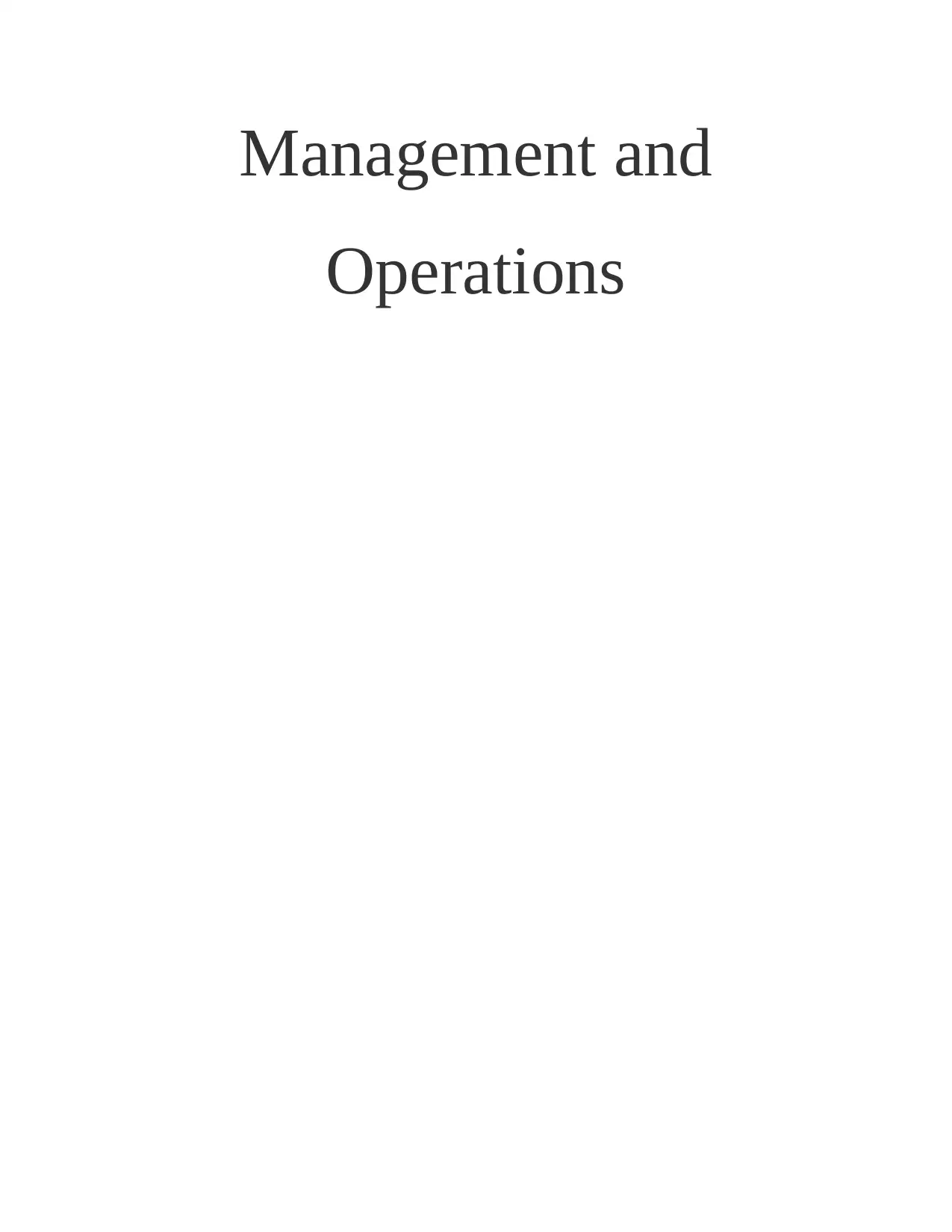
Management and
Operations
Operations
Paraphrase This Document
Need a fresh take? Get an instant paraphrase of this document with our AI Paraphraser
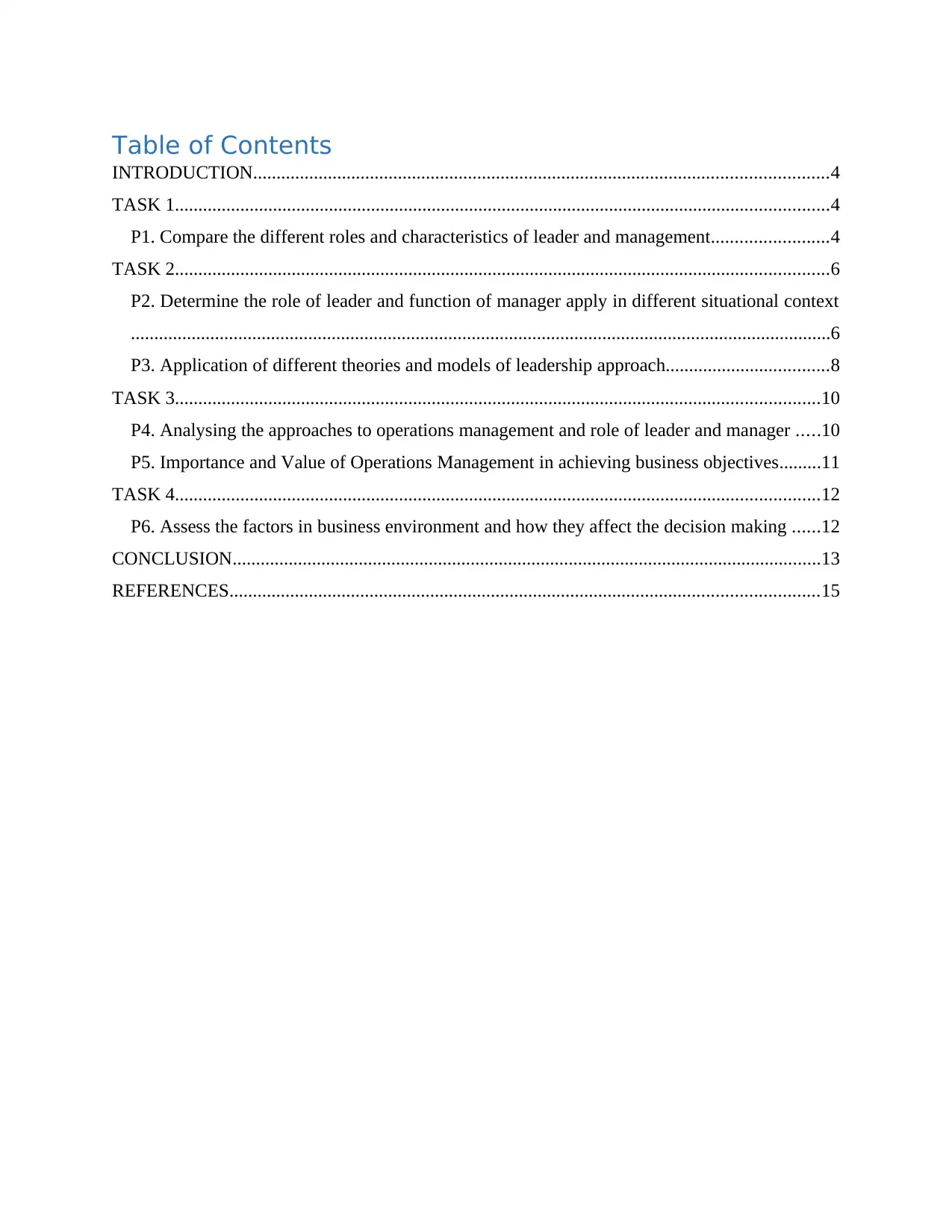
Table of Contents
INTRODUCTION...........................................................................................................................4
TASK 1............................................................................................................................................4
P1. Compare the different roles and characteristics of leader and management.........................4
TASK 2............................................................................................................................................6
P2. Determine the role of leader and function of manager apply in different situational context
......................................................................................................................................................6
P3. Application of different theories and models of leadership approach...................................8
TASK 3..........................................................................................................................................10
P4. Analysing the approaches to operations management and role of leader and manager .....10
P5. Importance and Value of Operations Management in achieving business objectives.........11
TASK 4..........................................................................................................................................12
P6. Assess the factors in business environment and how they affect the decision making ......12
CONCLUSION..............................................................................................................................13
REFERENCES..............................................................................................................................15
INTRODUCTION...........................................................................................................................4
TASK 1............................................................................................................................................4
P1. Compare the different roles and characteristics of leader and management.........................4
TASK 2............................................................................................................................................6
P2. Determine the role of leader and function of manager apply in different situational context
......................................................................................................................................................6
P3. Application of different theories and models of leadership approach...................................8
TASK 3..........................................................................................................................................10
P4. Analysing the approaches to operations management and role of leader and manager .....10
P5. Importance and Value of Operations Management in achieving business objectives.........11
TASK 4..........................................................................................................................................12
P6. Assess the factors in business environment and how they affect the decision making ......12
CONCLUSION..............................................................................................................................13
REFERENCES..............................................................................................................................15

⊘ This is a preview!⊘
Do you want full access?
Subscribe today to unlock all pages.

Trusted by 1+ million students worldwide
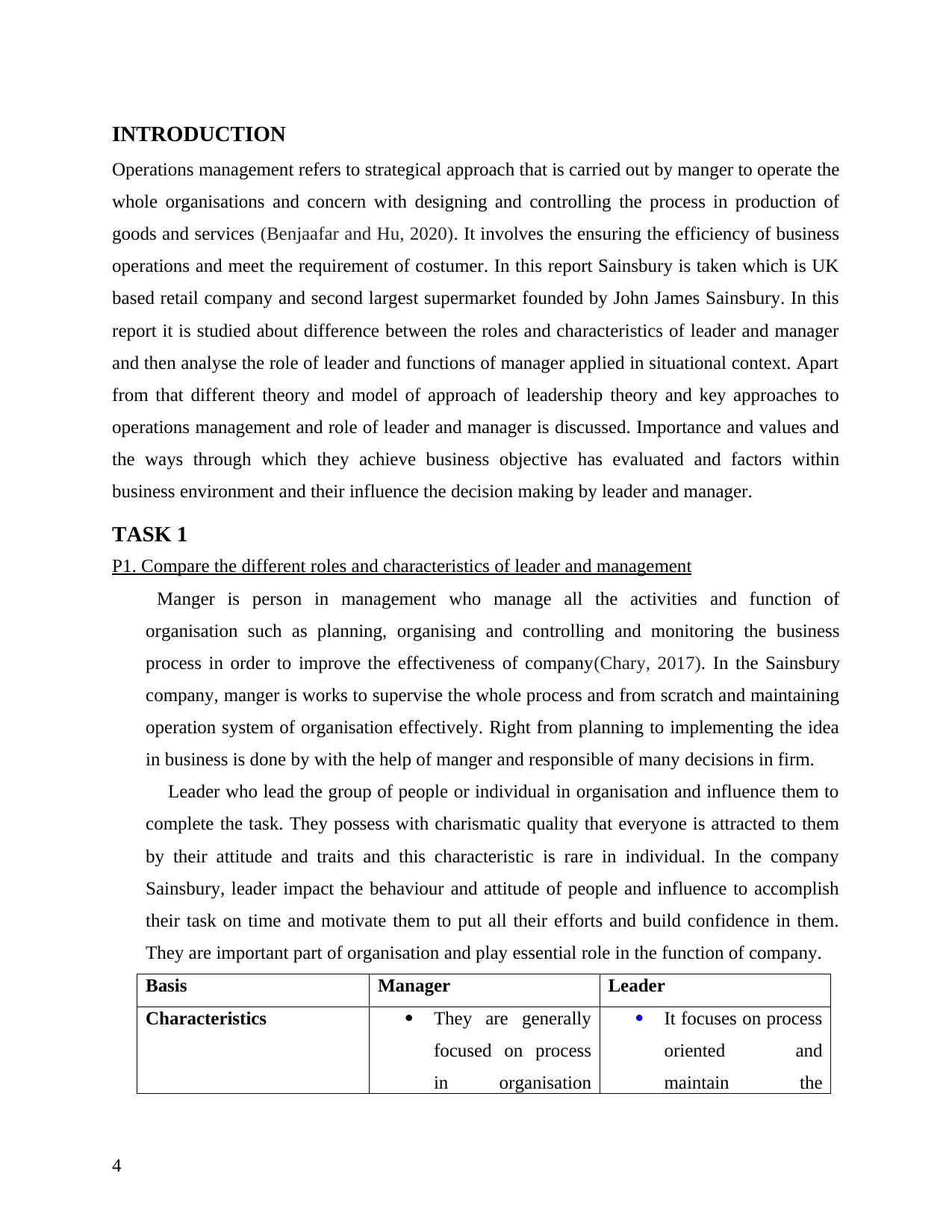
INTRODUCTION
Operations management refers to strategical approach that is carried out by manger to operate the
whole organisations and concern with designing and controlling the process in production of
goods and services (Benjaafar and Hu, 2020). It involves the ensuring the efficiency of business
operations and meet the requirement of costumer. In this report Sainsbury is taken which is UK
based retail company and second largest supermarket founded by John James Sainsbury. In this
report it is studied about difference between the roles and characteristics of leader and manager
and then analyse the role of leader and functions of manager applied in situational context. Apart
from that different theory and model of approach of leadership theory and key approaches to
operations management and role of leader and manager is discussed. Importance and values and
the ways through which they achieve business objective has evaluated and factors within
business environment and their influence the decision making by leader and manager.
TASK 1
P1. Compare the different roles and characteristics of leader and management
Manger is person in management who manage all the activities and function of
organisation such as planning, organising and controlling and monitoring the business
process in order to improve the effectiveness of company(Chary, 2017). In the Sainsbury
company, manger is works to supervise the whole process and from scratch and maintaining
operation system of organisation effectively. Right from planning to implementing the idea
in business is done by with the help of manger and responsible of many decisions in firm.
Leader who lead the group of people or individual in organisation and influence them to
complete the task. They possess with charismatic quality that everyone is attracted to them
by their attitude and traits and this characteristic is rare in individual. In the company
Sainsbury, leader impact the behaviour and attitude of people and influence to accomplish
their task on time and motivate them to put all their efforts and build confidence in them.
They are important part of organisation and play essential role in the function of company.
Basis Manager Leader
Characteristics They are generally
focused on process
in organisation
It focuses on process
oriented and
maintain the
4
Operations management refers to strategical approach that is carried out by manger to operate the
whole organisations and concern with designing and controlling the process in production of
goods and services (Benjaafar and Hu, 2020). It involves the ensuring the efficiency of business
operations and meet the requirement of costumer. In this report Sainsbury is taken which is UK
based retail company and second largest supermarket founded by John James Sainsbury. In this
report it is studied about difference between the roles and characteristics of leader and manager
and then analyse the role of leader and functions of manager applied in situational context. Apart
from that different theory and model of approach of leadership theory and key approaches to
operations management and role of leader and manager is discussed. Importance and values and
the ways through which they achieve business objective has evaluated and factors within
business environment and their influence the decision making by leader and manager.
TASK 1
P1. Compare the different roles and characteristics of leader and management
Manger is person in management who manage all the activities and function of
organisation such as planning, organising and controlling and monitoring the business
process in order to improve the effectiveness of company(Chary, 2017). In the Sainsbury
company, manger is works to supervise the whole process and from scratch and maintaining
operation system of organisation effectively. Right from planning to implementing the idea
in business is done by with the help of manger and responsible of many decisions in firm.
Leader who lead the group of people or individual in organisation and influence them to
complete the task. They possess with charismatic quality that everyone is attracted to them
by their attitude and traits and this characteristic is rare in individual. In the company
Sainsbury, leader impact the behaviour and attitude of people and influence to accomplish
their task on time and motivate them to put all their efforts and build confidence in them.
They are important part of organisation and play essential role in the function of company.
Basis Manager Leader
Characteristics They are generally
focused on process
in organisation
It focuses on process
oriented and
maintain the
4
Paraphrase This Document
Need a fresh take? Get an instant paraphrase of this document with our AI Paraphraser
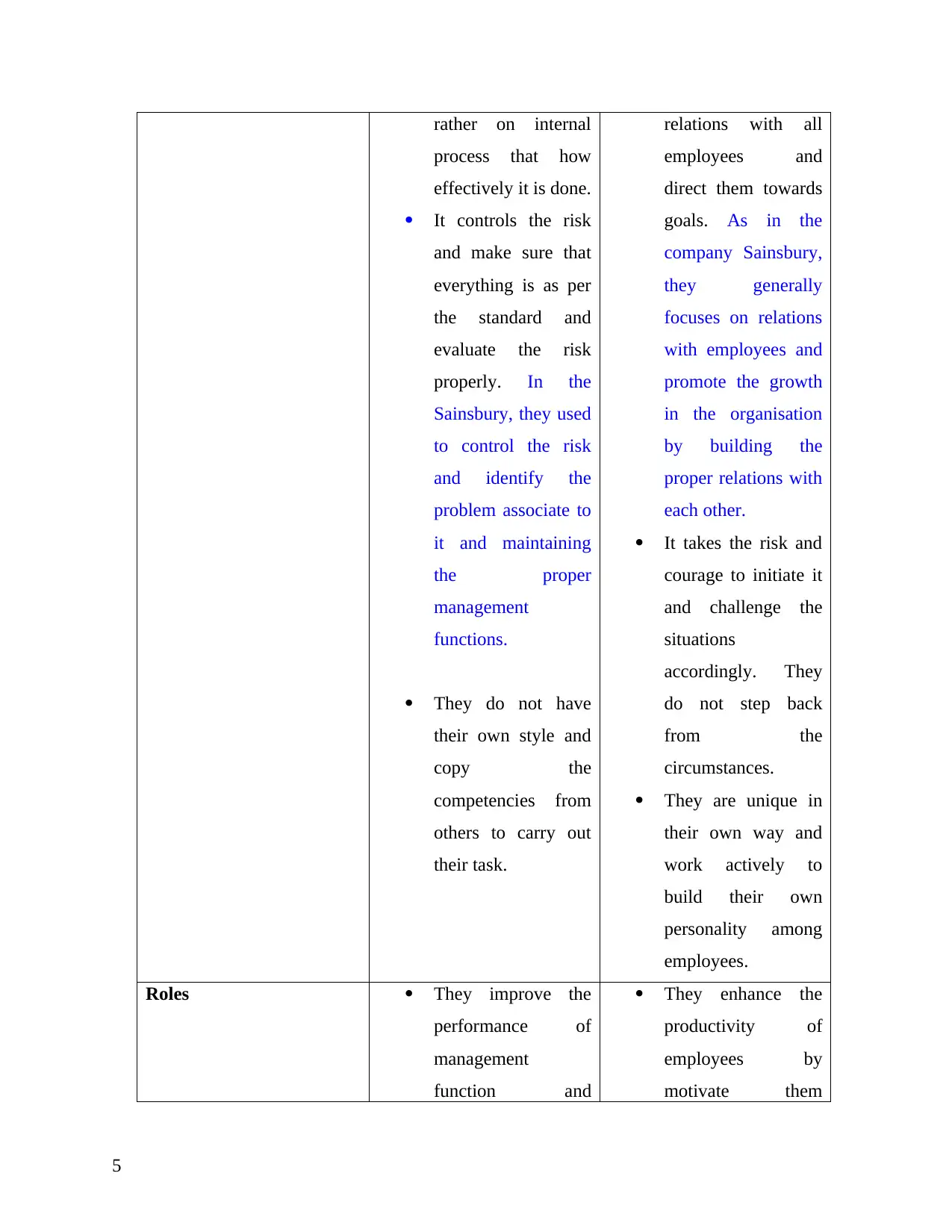
rather on internal
process that how
effectively it is done.
It controls the risk
and make sure that
everything is as per
the standard and
evaluate the risk
properly. In the
Sainsbury, they used
to control the risk
and identify the
problem associate to
it and maintaining
the proper
management
functions.
They do not have
their own style and
copy the
competencies from
others to carry out
their task.
relations with all
employees and
direct them towards
goals. As in the
company Sainsbury,
they generally
focuses on relations
with employees and
promote the growth
in the organisation
by building the
proper relations with
each other.
It takes the risk and
courage to initiate it
and challenge the
situations
accordingly. They
do not step back
from the
circumstances.
They are unique in
their own way and
work actively to
build their own
personality among
employees.
Roles They improve the
performance of
management
function and
They enhance the
productivity of
employees by
motivate them
5
process that how
effectively it is done.
It controls the risk
and make sure that
everything is as per
the standard and
evaluate the risk
properly. In the
Sainsbury, they used
to control the risk
and identify the
problem associate to
it and maintaining
the proper
management
functions.
They do not have
their own style and
copy the
competencies from
others to carry out
their task.
relations with all
employees and
direct them towards
goals. As in the
company Sainsbury,
they generally
focuses on relations
with employees and
promote the growth
in the organisation
by building the
proper relations with
each other.
It takes the risk and
courage to initiate it
and challenge the
situations
accordingly. They
do not step back
from the
circumstances.
They are unique in
their own way and
work actively to
build their own
personality among
employees.
Roles They improve the
performance of
management
function and
They enhance the
productivity of
employees by
motivate them
5
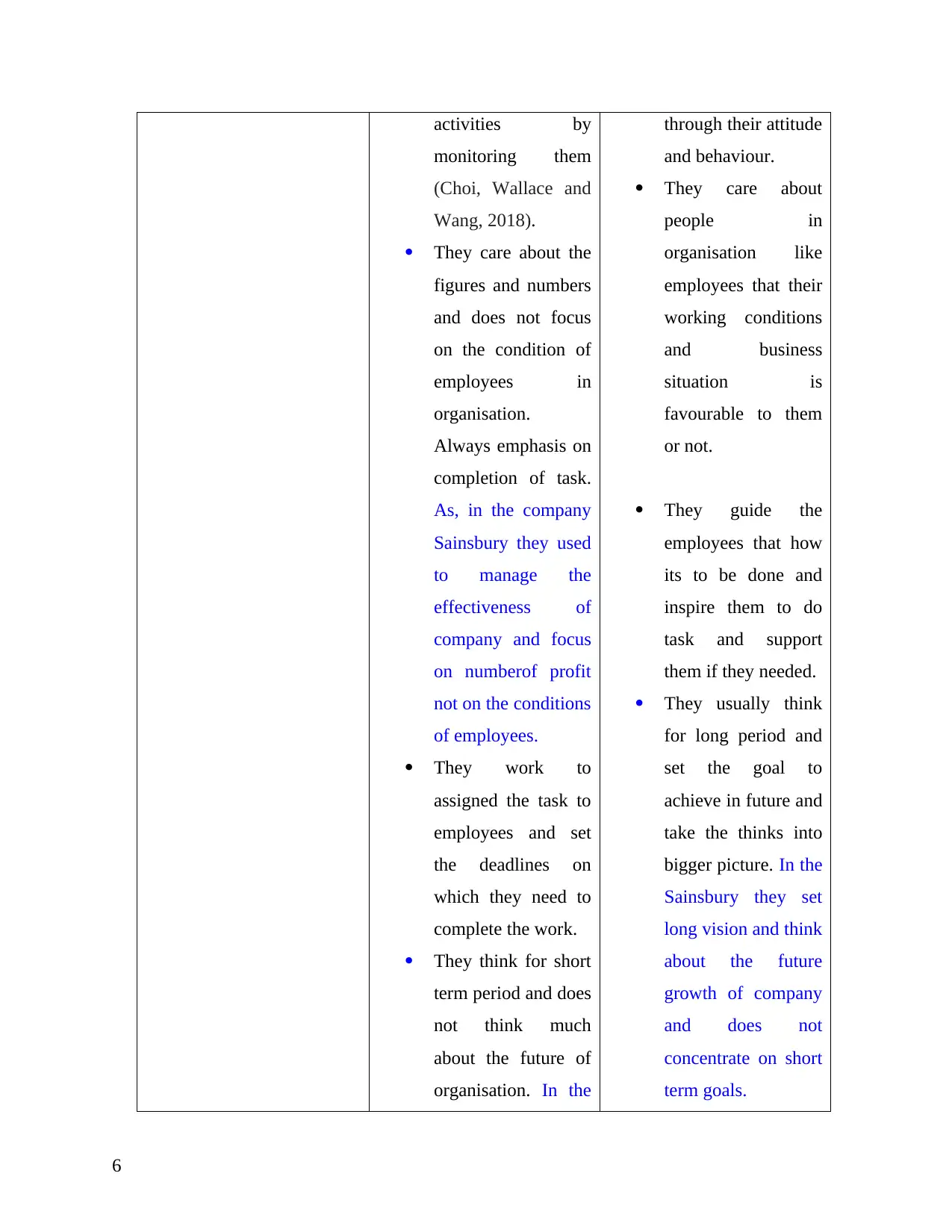
activities by
monitoring them
(Choi, Wallace and
Wang, 2018).
They care about the
figures and numbers
and does not focus
on the condition of
employees in
organisation.
Always emphasis on
completion of task.
As, in the company
Sainsbury they used
to manage the
effectiveness of
company and focus
on numberof profit
not on the conditions
of employees.
They work to
assigned the task to
employees and set
the deadlines on
which they need to
complete the work.
They think for short
term period and does
not think much
about the future of
organisation. In the
through their attitude
and behaviour.
They care about
people in
organisation like
employees that their
working conditions
and business
situation is
favourable to them
or not.
They guide the
employees that how
its to be done and
inspire them to do
task and support
them if they needed.
They usually think
for long period and
set the goal to
achieve in future and
take the thinks into
bigger picture. In the
Sainsbury they set
long vision and think
about the future
growth of company
and does not
concentrate on short
term goals.
6
monitoring them
(Choi, Wallace and
Wang, 2018).
They care about the
figures and numbers
and does not focus
on the condition of
employees in
organisation.
Always emphasis on
completion of task.
As, in the company
Sainsbury they used
to manage the
effectiveness of
company and focus
on numberof profit
not on the conditions
of employees.
They work to
assigned the task to
employees and set
the deadlines on
which they need to
complete the work.
They think for short
term period and does
not think much
about the future of
organisation. In the
through their attitude
and behaviour.
They care about
people in
organisation like
employees that their
working conditions
and business
situation is
favourable to them
or not.
They guide the
employees that how
its to be done and
inspire them to do
task and support
them if they needed.
They usually think
for long period and
set the goal to
achieve in future and
take the thinks into
bigger picture. In the
Sainsbury they set
long vision and think
about the future
growth of company
and does not
concentrate on short
term goals.
6
⊘ This is a preview!⊘
Do you want full access?
Subscribe today to unlock all pages.

Trusted by 1+ million students worldwide
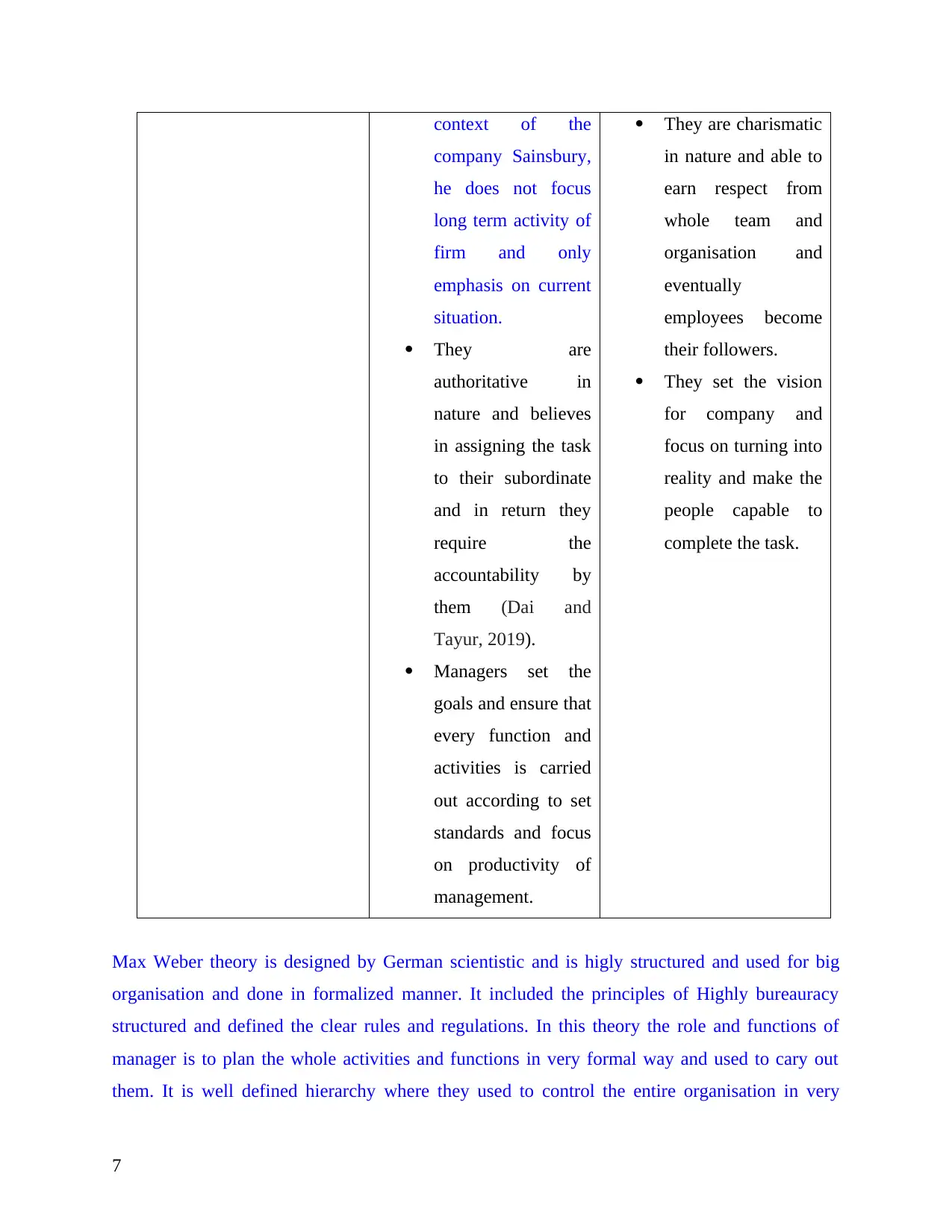
context of the
company Sainsbury,
he does not focus
long term activity of
firm and only
emphasis on current
situation.
They are
authoritative in
nature and believes
in assigning the task
to their subordinate
and in return they
require the
accountability by
them (Dai and
Tayur, 2019).
Managers set the
goals and ensure that
every function and
activities is carried
out according to set
standards and focus
on productivity of
management.
They are charismatic
in nature and able to
earn respect from
whole team and
organisation and
eventually
employees become
their followers.
They set the vision
for company and
focus on turning into
reality and make the
people capable to
complete the task.
Max Weber theory is designed by German scientistic and is higly structured and used for big
organisation and done in formalized manner. It included the principles of Highly bureauracy
structured and defined the clear rules and regulations. In this theory the role and functions of
manager is to plan the whole activities and functions in very formal way and used to cary out
them. It is well defined hierarchy where they used to control the entire organisation in very
7
company Sainsbury,
he does not focus
long term activity of
firm and only
emphasis on current
situation.
They are
authoritative in
nature and believes
in assigning the task
to their subordinate
and in return they
require the
accountability by
them (Dai and
Tayur, 2019).
Managers set the
goals and ensure that
every function and
activities is carried
out according to set
standards and focus
on productivity of
management.
They are charismatic
in nature and able to
earn respect from
whole team and
organisation and
eventually
employees become
their followers.
They set the vision
for company and
focus on turning into
reality and make the
people capable to
complete the task.
Max Weber theory is designed by German scientistic and is higly structured and used for big
organisation and done in formalized manner. It included the principles of Highly bureauracy
structured and defined the clear rules and regulations. In this theory the role and functions of
manager is to plan the whole activities and functions in very formal way and used to cary out
them. It is well defined hierarchy where they used to control the entire organisation in very
7
Paraphrase This Document
Need a fresh take? Get an instant paraphrase of this document with our AI Paraphraser
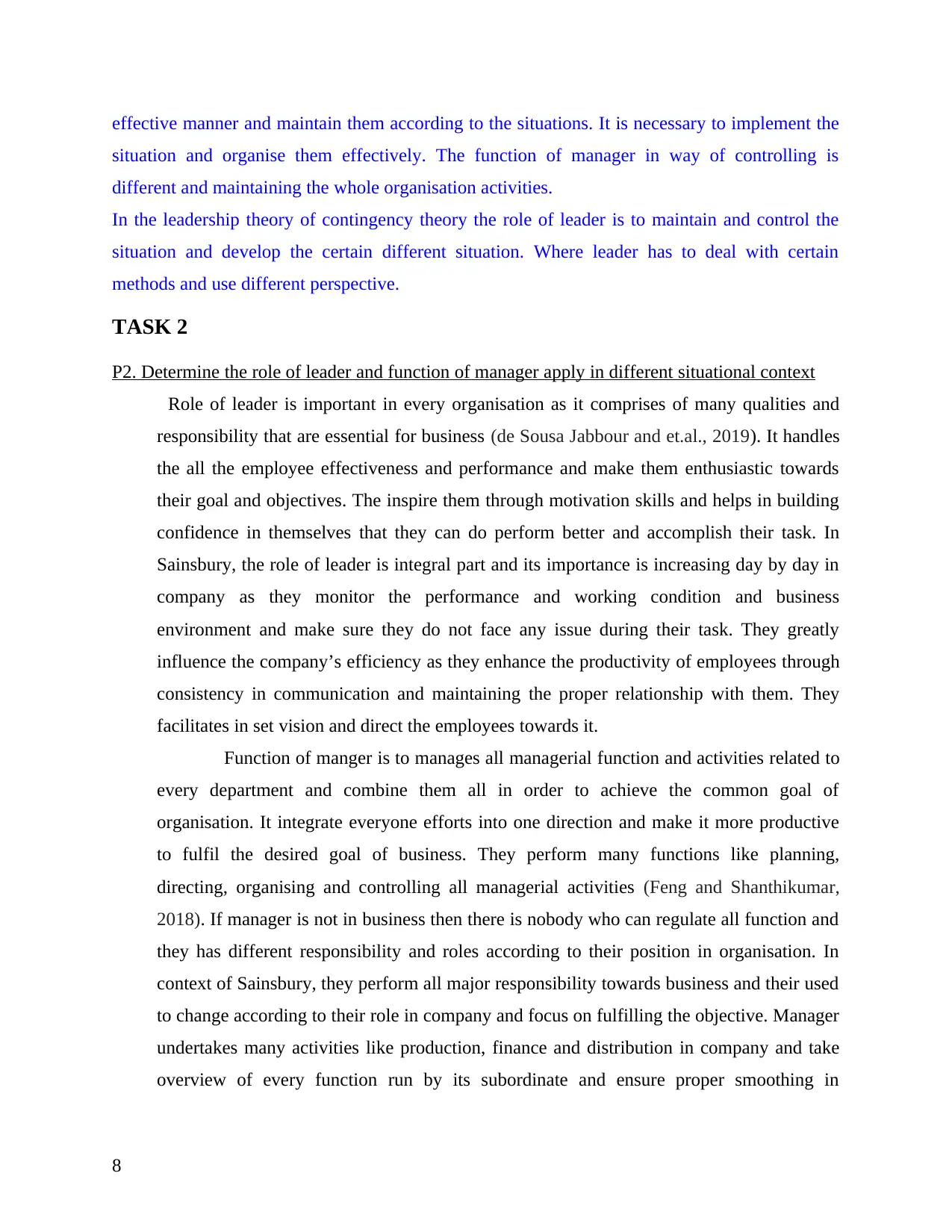
effective manner and maintain them according to the situations. It is necessary to implement the
situation and organise them effectively. The function of manager in way of controlling is
different and maintaining the whole organisation activities.
In the leadership theory of contingency theory the role of leader is to maintain and control the
situation and develop the certain different situation. Where leader has to deal with certain
methods and use different perspective.
TASK 2
P2. Determine the role of leader and function of manager apply in different situational context
Role of leader is important in every organisation as it comprises of many qualities and
responsibility that are essential for business (de Sousa Jabbour and et.al., 2019). It handles
the all the employee effectiveness and performance and make them enthusiastic towards
their goal and objectives. The inspire them through motivation skills and helps in building
confidence in themselves that they can do perform better and accomplish their task. In
Sainsbury, the role of leader is integral part and its importance is increasing day by day in
company as they monitor the performance and working condition and business
environment and make sure they do not face any issue during their task. They greatly
influence the company’s efficiency as they enhance the productivity of employees through
consistency in communication and maintaining the proper relationship with them. They
facilitates in set vision and direct the employees towards it.
Function of manger is to manages all managerial function and activities related to
every department and combine them all in order to achieve the common goal of
organisation. It integrate everyone efforts into one direction and make it more productive
to fulfil the desired goal of business. They perform many functions like planning,
directing, organising and controlling all managerial activities (Feng and Shanthikumar,
2018). If manager is not in business then there is nobody who can regulate all function and
they has different responsibility and roles according to their position in organisation. In
context of Sainsbury, they perform all major responsibility towards business and their used
to change according to their role in company and focus on fulfilling the objective. Manager
undertakes many activities like production, finance and distribution in company and take
overview of every function run by its subordinate and ensure proper smoothing in
8
situation and organise them effectively. The function of manager in way of controlling is
different and maintaining the whole organisation activities.
In the leadership theory of contingency theory the role of leader is to maintain and control the
situation and develop the certain different situation. Where leader has to deal with certain
methods and use different perspective.
TASK 2
P2. Determine the role of leader and function of manager apply in different situational context
Role of leader is important in every organisation as it comprises of many qualities and
responsibility that are essential for business (de Sousa Jabbour and et.al., 2019). It handles
the all the employee effectiveness and performance and make them enthusiastic towards
their goal and objectives. The inspire them through motivation skills and helps in building
confidence in themselves that they can do perform better and accomplish their task. In
Sainsbury, the role of leader is integral part and its importance is increasing day by day in
company as they monitor the performance and working condition and business
environment and make sure they do not face any issue during their task. They greatly
influence the company’s efficiency as they enhance the productivity of employees through
consistency in communication and maintaining the proper relationship with them. They
facilitates in set vision and direct the employees towards it.
Function of manger is to manages all managerial function and activities related to
every department and combine them all in order to achieve the common goal of
organisation. It integrate everyone efforts into one direction and make it more productive
to fulfil the desired goal of business. They perform many functions like planning,
directing, organising and controlling all managerial activities (Feng and Shanthikumar,
2018). If manager is not in business then there is nobody who can regulate all function and
they has different responsibility and roles according to their position in organisation. In
context of Sainsbury, they perform all major responsibility towards business and their used
to change according to their role in company and focus on fulfilling the objective. Manager
undertakes many activities like production, finance and distribution in company and take
overview of every function run by its subordinate and ensure proper smoothing in
8
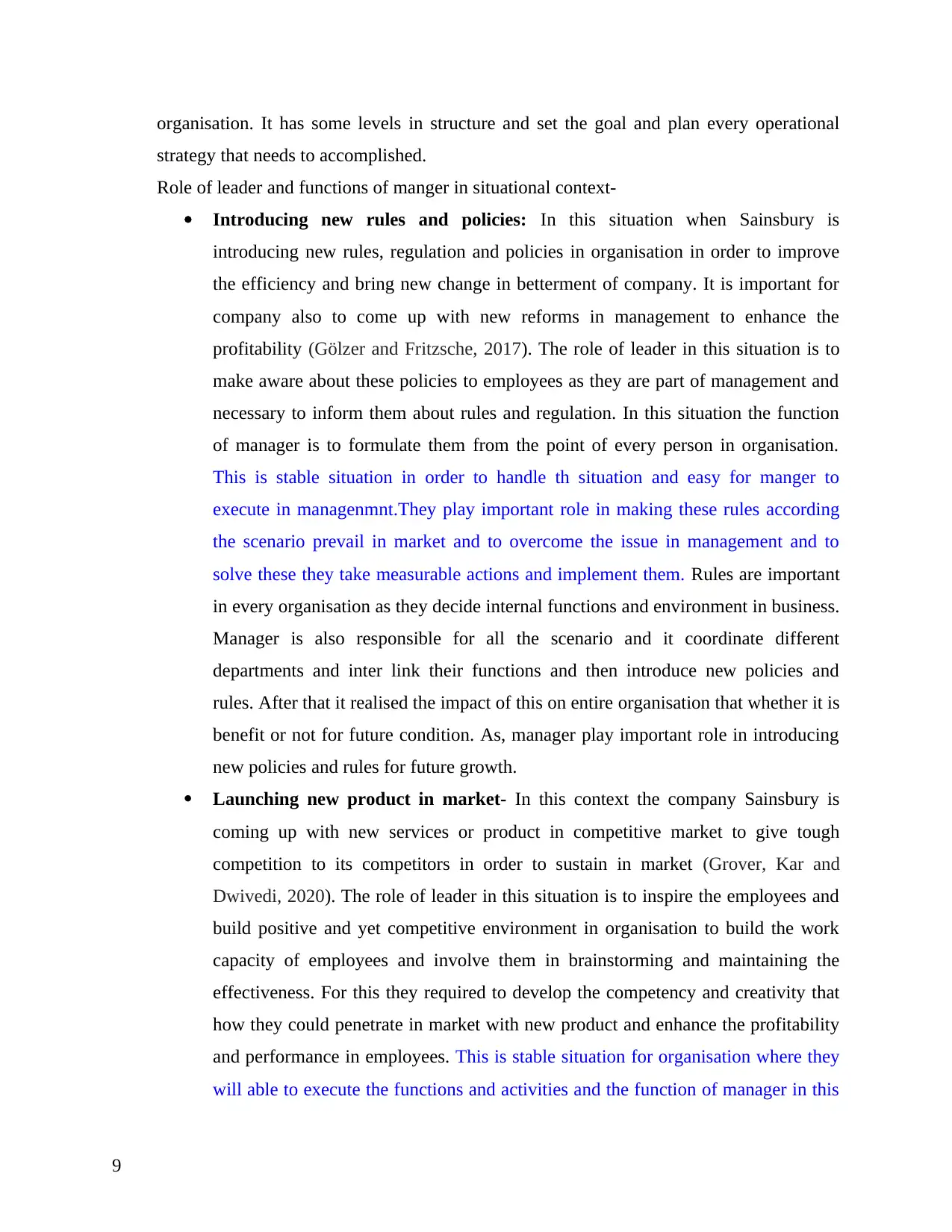
organisation. It has some levels in structure and set the goal and plan every operational
strategy that needs to accomplished.
Role of leader and functions of manger in situational context-
Introducing new rules and policies: In this situation when Sainsbury is
introducing new rules, regulation and policies in organisation in order to improve
the efficiency and bring new change in betterment of company. It is important for
company also to come up with new reforms in management to enhance the
profitability (Gölzer and Fritzsche, 2017). The role of leader in this situation is to
make aware about these policies to employees as they are part of management and
necessary to inform them about rules and regulation. In this situation the function
of manager is to formulate them from the point of every person in organisation.
This is stable situation in order to handle th situation and easy for manger to
execute in managenmnt.They play important role in making these rules according
the scenario prevail in market and to overcome the issue in management and to
solve these they take measurable actions and implement them. Rules are important
in every organisation as they decide internal functions and environment in business.
Manager is also responsible for all the scenario and it coordinate different
departments and inter link their functions and then introduce new policies and
rules. After that it realised the impact of this on entire organisation that whether it is
benefit or not for future condition. As, manager play important role in introducing
new policies and rules for future growth.
Launching new product in market- In this context the company Sainsbury is
coming up with new services or product in competitive market to give tough
competition to its competitors in order to sustain in market (Grover, Kar and
Dwivedi, 2020). The role of leader in this situation is to inspire the employees and
build positive and yet competitive environment in organisation to build the work
capacity of employees and involve them in brainstorming and maintaining the
effectiveness. For this they required to develop the competency and creativity that
how they could penetrate in market with new product and enhance the profitability
and performance in employees. This is stable situation for organisation where they
will able to execute the functions and activities and the function of manager in this
9
strategy that needs to accomplished.
Role of leader and functions of manger in situational context-
Introducing new rules and policies: In this situation when Sainsbury is
introducing new rules, regulation and policies in organisation in order to improve
the efficiency and bring new change in betterment of company. It is important for
company also to come up with new reforms in management to enhance the
profitability (Gölzer and Fritzsche, 2017). The role of leader in this situation is to
make aware about these policies to employees as they are part of management and
necessary to inform them about rules and regulation. In this situation the function
of manager is to formulate them from the point of every person in organisation.
This is stable situation in order to handle th situation and easy for manger to
execute in managenmnt.They play important role in making these rules according
the scenario prevail in market and to overcome the issue in management and to
solve these they take measurable actions and implement them. Rules are important
in every organisation as they decide internal functions and environment in business.
Manager is also responsible for all the scenario and it coordinate different
departments and inter link their functions and then introduce new policies and
rules. After that it realised the impact of this on entire organisation that whether it is
benefit or not for future condition. As, manager play important role in introducing
new policies and rules for future growth.
Launching new product in market- In this context the company Sainsbury is
coming up with new services or product in competitive market to give tough
competition to its competitors in order to sustain in market (Grover, Kar and
Dwivedi, 2020). The role of leader in this situation is to inspire the employees and
build positive and yet competitive environment in organisation to build the work
capacity of employees and involve them in brainstorming and maintaining the
effectiveness. For this they required to develop the competency and creativity that
how they could penetrate in market with new product and enhance the profitability
and performance in employees. This is stable situation for organisation where they
will able to execute the functions and activities and the function of manager in this
9
⊘ This is a preview!⊘
Do you want full access?
Subscribe today to unlock all pages.

Trusted by 1+ million students worldwide
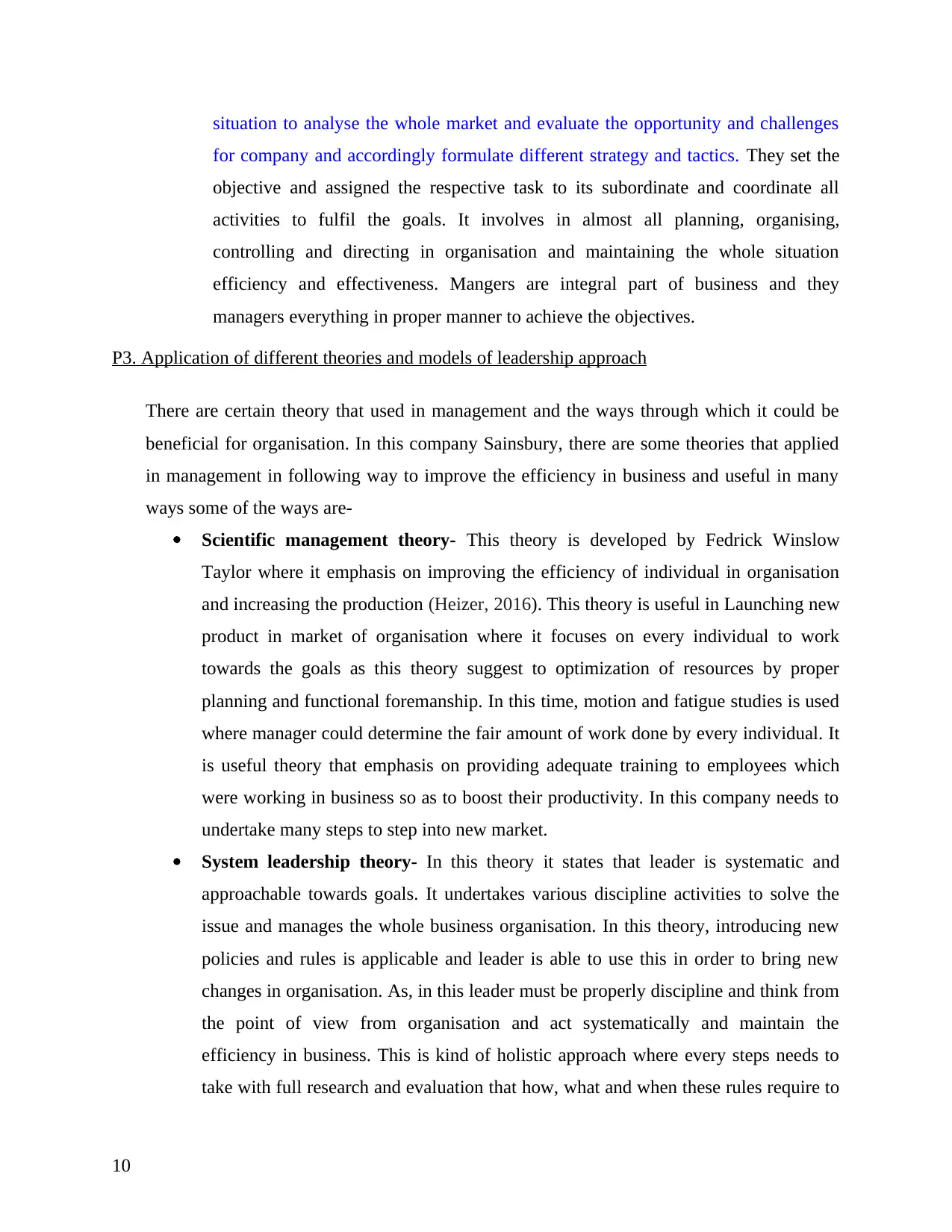
situation to analyse the whole market and evaluate the opportunity and challenges
for company and accordingly formulate different strategy and tactics. They set the
objective and assigned the respective task to its subordinate and coordinate all
activities to fulfil the goals. It involves in almost all planning, organising,
controlling and directing in organisation and maintaining the whole situation
efficiency and effectiveness. Mangers are integral part of business and they
managers everything in proper manner to achieve the objectives.
P3. Application of different theories and models of leadership approach
There are certain theory that used in management and the ways through which it could be
beneficial for organisation. In this company Sainsbury, there are some theories that applied
in management in following way to improve the efficiency in business and useful in many
ways some of the ways are-
Scientific management theory- This theory is developed by Fedrick Winslow
Taylor where it emphasis on improving the efficiency of individual in organisation
and increasing the production (Heizer, 2016). This theory is useful in Launching new
product in market of organisation where it focuses on every individual to work
towards the goals as this theory suggest to optimization of resources by proper
planning and functional foremanship. In this time, motion and fatigue studies is used
where manager could determine the fair amount of work done by every individual. It
is useful theory that emphasis on providing adequate training to employees which
were working in business so as to boost their productivity. In this company needs to
undertake many steps to step into new market.
System leadership theory- In this theory it states that leader is systematic and
approachable towards goals. It undertakes various discipline activities to solve the
issue and manages the whole business organisation. In this theory, introducing new
policies and rules is applicable and leader is able to use this in order to bring new
changes in organisation. As, in this leader must be properly discipline and think from
the point of view from organisation and act systematically and maintain the
efficiency in business. This is kind of holistic approach where every steps needs to
take with full research and evaluation that how, what and when these rules require to
10
for company and accordingly formulate different strategy and tactics. They set the
objective and assigned the respective task to its subordinate and coordinate all
activities to fulfil the goals. It involves in almost all planning, organising,
controlling and directing in organisation and maintaining the whole situation
efficiency and effectiveness. Mangers are integral part of business and they
managers everything in proper manner to achieve the objectives.
P3. Application of different theories and models of leadership approach
There are certain theory that used in management and the ways through which it could be
beneficial for organisation. In this company Sainsbury, there are some theories that applied
in management in following way to improve the efficiency in business and useful in many
ways some of the ways are-
Scientific management theory- This theory is developed by Fedrick Winslow
Taylor where it emphasis on improving the efficiency of individual in organisation
and increasing the production (Heizer, 2016). This theory is useful in Launching new
product in market of organisation where it focuses on every individual to work
towards the goals as this theory suggest to optimization of resources by proper
planning and functional foremanship. In this time, motion and fatigue studies is used
where manager could determine the fair amount of work done by every individual. It
is useful theory that emphasis on providing adequate training to employees which
were working in business so as to boost their productivity. In this company needs to
undertake many steps to step into new market.
System leadership theory- In this theory it states that leader is systematic and
approachable towards goals. It undertakes various discipline activities to solve the
issue and manages the whole business organisation. In this theory, introducing new
policies and rules is applicable and leader is able to use this in order to bring new
changes in organisation. As, in this leader must be properly discipline and think from
the point of view from organisation and act systematically and maintain the
efficiency in business. This is kind of holistic approach where every steps needs to
take with full research and evaluation that how, what and when these rules require to
10
Paraphrase This Document
Need a fresh take? Get an instant paraphrase of this document with our AI Paraphraser
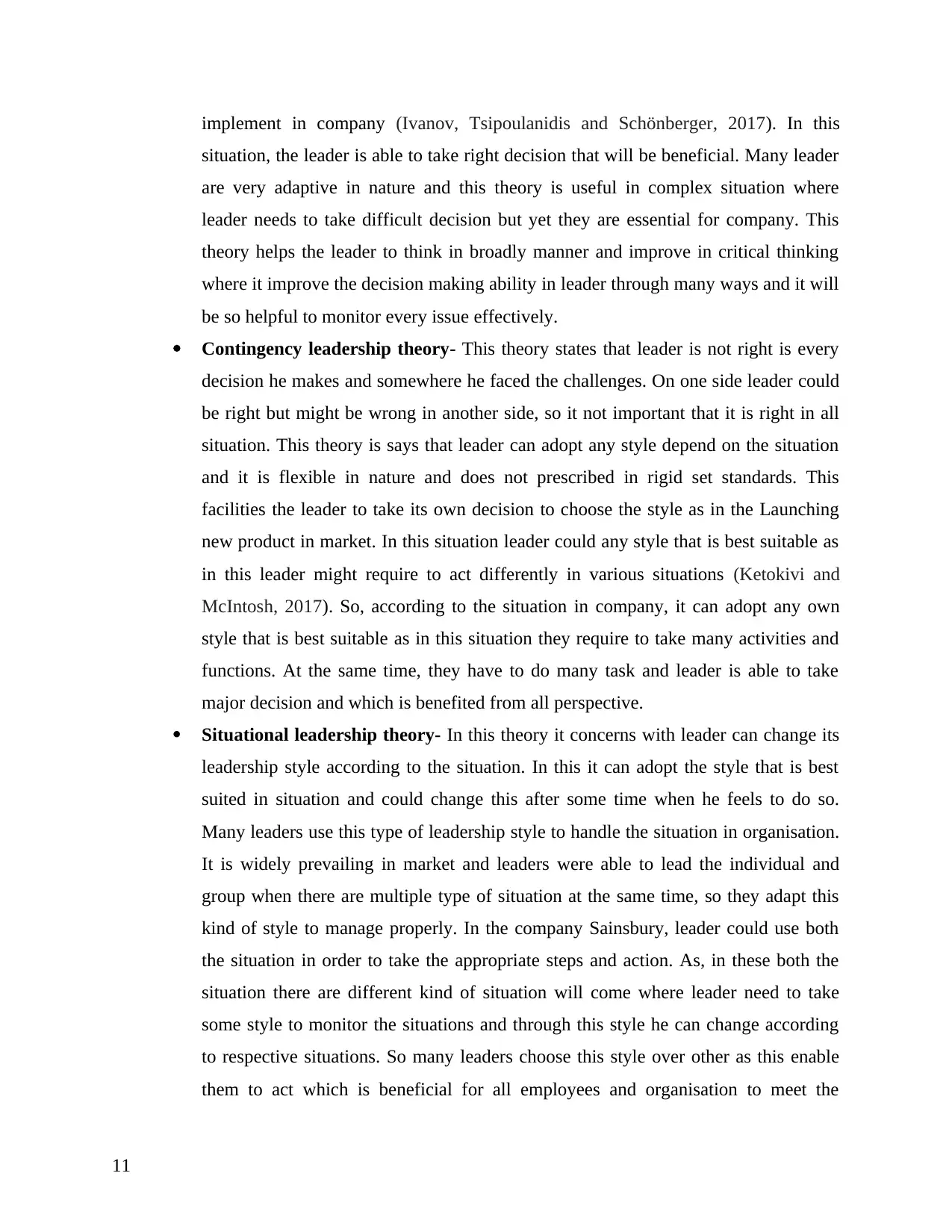
implement in company (Ivanov, Tsipoulanidis and Schönberger, 2017). In this
situation, the leader is able to take right decision that will be beneficial. Many leader
are very adaptive in nature and this theory is useful in complex situation where
leader needs to take difficult decision but yet they are essential for company. This
theory helps the leader to think in broadly manner and improve in critical thinking
where it improve the decision making ability in leader through many ways and it will
be so helpful to monitor every issue effectively.
Contingency leadership theory- This theory states that leader is not right is every
decision he makes and somewhere he faced the challenges. On one side leader could
be right but might be wrong in another side, so it not important that it is right in all
situation. This theory is says that leader can adopt any style depend on the situation
and it is flexible in nature and does not prescribed in rigid set standards. This
facilities the leader to take its own decision to choose the style as in the Launching
new product in market. In this situation leader could any style that is best suitable as
in this leader might require to act differently in various situations (Ketokivi and
McIntosh, 2017). So, according to the situation in company, it can adopt any own
style that is best suitable as in this situation they require to take many activities and
functions. At the same time, they have to do many task and leader is able to take
major decision and which is benefited from all perspective.
Situational leadership theory- In this theory it concerns with leader can change its
leadership style according to the situation. In this it can adopt the style that is best
suited in situation and could change this after some time when he feels to do so.
Many leaders use this type of leadership style to handle the situation in organisation.
It is widely prevailing in market and leaders were able to lead the individual and
group when there are multiple type of situation at the same time, so they adapt this
kind of style to manage properly. In the company Sainsbury, leader could use both
the situation in order to take the appropriate steps and action. As, in these both the
situation there are different kind of situation will come where leader need to take
some style to monitor the situations and through this style he can change according
to respective situations. So many leaders choose this style over other as this enable
them to act which is beneficial for all employees and organisation to meet the
11
situation, the leader is able to take right decision that will be beneficial. Many leader
are very adaptive in nature and this theory is useful in complex situation where
leader needs to take difficult decision but yet they are essential for company. This
theory helps the leader to think in broadly manner and improve in critical thinking
where it improve the decision making ability in leader through many ways and it will
be so helpful to monitor every issue effectively.
Contingency leadership theory- This theory states that leader is not right is every
decision he makes and somewhere he faced the challenges. On one side leader could
be right but might be wrong in another side, so it not important that it is right in all
situation. This theory is says that leader can adopt any style depend on the situation
and it is flexible in nature and does not prescribed in rigid set standards. This
facilities the leader to take its own decision to choose the style as in the Launching
new product in market. In this situation leader could any style that is best suitable as
in this leader might require to act differently in various situations (Ketokivi and
McIntosh, 2017). So, according to the situation in company, it can adopt any own
style that is best suitable as in this situation they require to take many activities and
functions. At the same time, they have to do many task and leader is able to take
major decision and which is benefited from all perspective.
Situational leadership theory- In this theory it concerns with leader can change its
leadership style according to the situation. In this it can adopt the style that is best
suited in situation and could change this after some time when he feels to do so.
Many leaders use this type of leadership style to handle the situation in organisation.
It is widely prevailing in market and leaders were able to lead the individual and
group when there are multiple type of situation at the same time, so they adapt this
kind of style to manage properly. In the company Sainsbury, leader could use both
the situation in order to take the appropriate steps and action. As, in these both the
situation there are different kind of situation will come where leader need to take
some style to monitor the situations and through this style he can change according
to respective situations. So many leaders choose this style over other as this enable
them to act which is beneficial for all employees and organisation to meet the
11
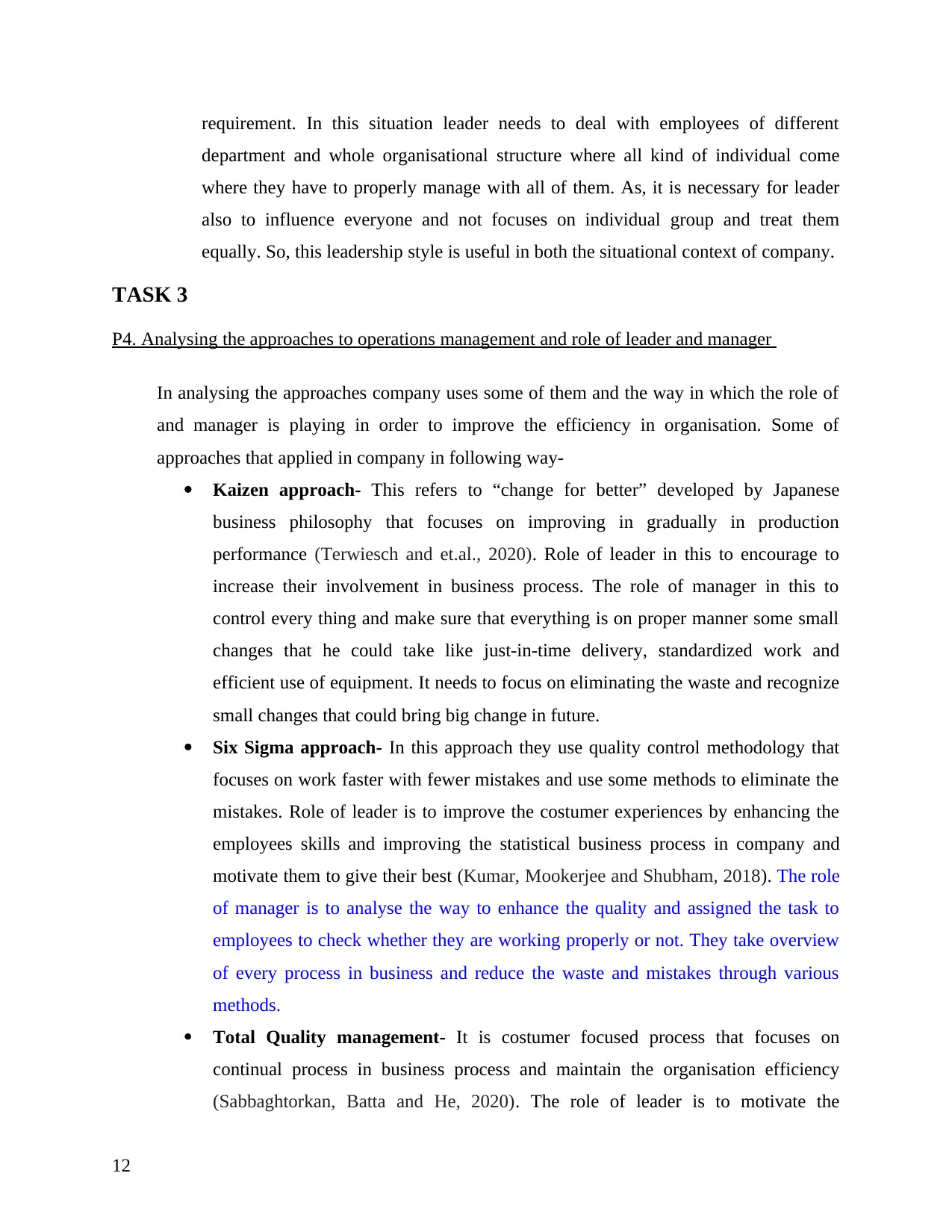
requirement. In this situation leader needs to deal with employees of different
department and whole organisational structure where all kind of individual come
where they have to properly manage with all of them. As, it is necessary for leader
also to influence everyone and not focuses on individual group and treat them
equally. So, this leadership style is useful in both the situational context of company.
TASK 3
P4. Analysing the approaches to operations management and role of leader and manager
In analysing the approaches company uses some of them and the way in which the role of
and manager is playing in order to improve the efficiency in organisation. Some of
approaches that applied in company in following way-
Kaizen approach- This refers to “change for better” developed by Japanese
business philosophy that focuses on improving in gradually in production
performance (Terwiesch and et.al., 2020). Role of leader in this to encourage to
increase their involvement in business process. The role of manager in this to
control every thing and make sure that everything is on proper manner some small
changes that he could take like just-in-time delivery, standardized work and
efficient use of equipment. It needs to focus on eliminating the waste and recognize
small changes that could bring big change in future.
Six Sigma approach- In this approach they use quality control methodology that
focuses on work faster with fewer mistakes and use some methods to eliminate the
mistakes. Role of leader is to improve the costumer experiences by enhancing the
employees skills and improving the statistical business process in company and
motivate them to give their best (Kumar, Mookerjee and Shubham, 2018). The role
of manager is to analyse the way to enhance the quality and assigned the task to
employees to check whether they are working properly or not. They take overview
of every process in business and reduce the waste and mistakes through various
methods.
Total Quality management- It is costumer focused process that focuses on
continual process in business process and maintain the organisation efficiency
(Sabbaghtorkan, Batta and He, 2020). The role of leader is to motivate the
12
department and whole organisational structure where all kind of individual come
where they have to properly manage with all of them. As, it is necessary for leader
also to influence everyone and not focuses on individual group and treat them
equally. So, this leadership style is useful in both the situational context of company.
TASK 3
P4. Analysing the approaches to operations management and role of leader and manager
In analysing the approaches company uses some of them and the way in which the role of
and manager is playing in order to improve the efficiency in organisation. Some of
approaches that applied in company in following way-
Kaizen approach- This refers to “change for better” developed by Japanese
business philosophy that focuses on improving in gradually in production
performance (Terwiesch and et.al., 2020). Role of leader in this to encourage to
increase their involvement in business process. The role of manager in this to
control every thing and make sure that everything is on proper manner some small
changes that he could take like just-in-time delivery, standardized work and
efficient use of equipment. It needs to focus on eliminating the waste and recognize
small changes that could bring big change in future.
Six Sigma approach- In this approach they use quality control methodology that
focuses on work faster with fewer mistakes and use some methods to eliminate the
mistakes. Role of leader is to improve the costumer experiences by enhancing the
employees skills and improving the statistical business process in company and
motivate them to give their best (Kumar, Mookerjee and Shubham, 2018). The role
of manager is to analyse the way to enhance the quality and assigned the task to
employees to check whether they are working properly or not. They take overview
of every process in business and reduce the waste and mistakes through various
methods.
Total Quality management- It is costumer focused process that focuses on
continual process in business process and maintain the organisation efficiency
(Sabbaghtorkan, Batta and He, 2020). The role of leader is to motivate the
12
⊘ This is a preview!⊘
Do you want full access?
Subscribe today to unlock all pages.

Trusted by 1+ million students worldwide
1 out of 18
Related Documents
Your All-in-One AI-Powered Toolkit for Academic Success.
+13062052269
info@desklib.com
Available 24*7 on WhatsApp / Email
![[object Object]](/_next/static/media/star-bottom.7253800d.svg)
Unlock your academic potential
Copyright © 2020–2026 A2Z Services. All Rights Reserved. Developed and managed by ZUCOL.





